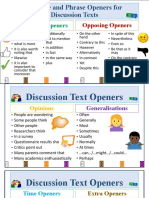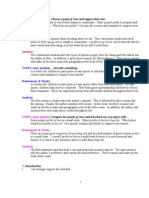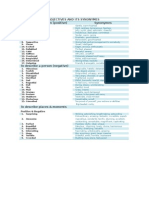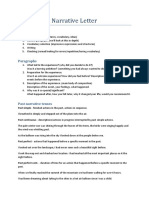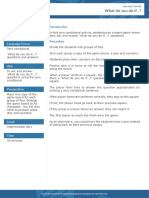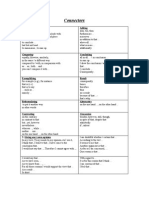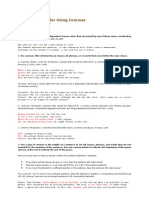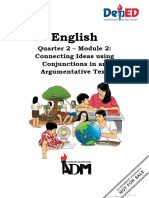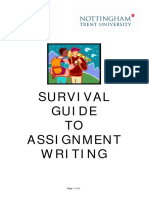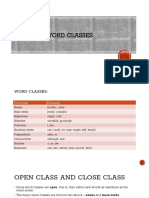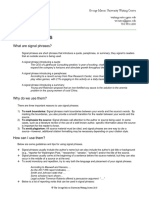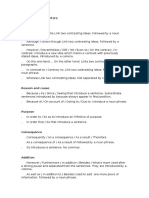0% found this document useful (0 votes)
200 views12 pagesConnectors
connectors, ENAP
Uploaded by
LucCopyright
© © All Rights Reserved
We take content rights seriously. If you suspect this is your content, claim it here.
Available Formats
Download as PDF or read online on Scribd
0% found this document useful (0 votes)
200 views12 pagesConnectors
connectors, ENAP
Uploaded by
LucCopyright
© © All Rights Reserved
We take content rights seriously. If you suspect this is your content, claim it here.
Available Formats
Download as PDF or read online on Scribd
/ 12
Connectives
The main connectives are grouped below
according to the similarity of their
meaning with the three basic connectives
and, or, but. For information about their
use in sentences, you should look in a
good dictionary.
1 enumeration
A. listing
a reinforcement
2 addition | huni
land
B transition
summation
D_ apposition
E_ result
F inference
2 G reformulation
me: H replacement
ab I contrast
J concession
I and A Listing:
1 Enumeration indicates a cataloguing of what is being said.
‘Most enumerations belong to clearly defined sets:
first, furthermore . .. ) [finally,
one, ... )[two,... )[three, .
firstly), ... )[second(ly),... )[third(ly), . -..)
above all
‘at bar not lease} ark the end of an ascending order
first and foremost
first and most important(ly)
} mark the beginning of a descending order
to begin/start with,
in the second place, .
moreover, ..
and to conclude,
next, 5
then, ... ) [afterward, .
lastly/finally, . . .
2. Addition, to what has been previously indicated.
a Reinforcement (includes confirmation):
also
again
furthermore
further
moreover
what is more
then
in addition
besides
above all
too
as well (as)
b Equation (similarity with what has preceded):
equally
likewise
similarly
correspondingly
in the same way
Note: 1 From the point of view of meaning the following are often
the negative equivalents of and: either; neither; nor; not only
(but) also...; neither....nor...
Neither leaves the series open for further additions,
whereas nor concludes it.
2 The truth of a previous assertion may be confirmed or
contradicted by: indeed; actually; in (actual) fact; really; in
reality
‘Transition can lead to a new stage in the sequence of thought:
now
with reference/respect/regard to
regarding
let us (now) turn to...
as for ’ often used when discussing something briefly
as to
incidentally
by the way
come to think of it
indicates a digression
and an afterthought
spoken
language
talking/speaking of . . . (informal)
apropos . . . (formal)
that reminds me . .
to introduce
a digression
C Summation indicates a generalisation or summing-up of what has
preceded:
in conclusion
to conclude
to sum up briefly
in brief
to summarise
altogether
overall
then
therefore
thus
D Apposition is used to refer back to previous sentences or to
parallel or related references:
ie. that is, that’s to say
viz. namely
in other words
or, or rather, or better
and
as follows
e.g. for example, for instance, say, such as, including, included,
especially, particularly, in particular, notably, chiefly, mainly,
mostly (of)
The relationships that these phrases can express include:
reformulation (see 2A below), exemplification and
particularisation.
E_ Result expresses the consequence or result of what was said
before:
so
therefore
as a result/consequence
the result/consequence is/was . . .
accordingly
consequently
now
then
because of this/that
thus
hence
for this/that reason
F Inference indicates a deduction from what is implicit in the
preceding sentence(s):
then
in other words
in that case
else .
otherwi equivalent to a negative condition
that implies
my conclusion is
2 or A. Reformulation, to express something in another way:
better
rather
in other words
in that case
to put it (more) simply
B_ Replacement, to express an alternative to what has preceded:
again
alternatively
rather
better/worse (still)
on the other hand
the alternative is...
another possibility would be
3 but A Contrast, with what has preceded:
instead
conversely
then
on the contrary
by (way of) contrast
in comparison
(on the one hand) . . . on the other hand
B_ Concession indicates the unexpected, surprising nature of what is
being said in view of what was said before:
besides yet
(or) else in any case
however at any rate
nevertheless for all that
nonetheless in spite offdespite that
notwithstanding after all
only at the same time
still on the other hand
while all the same
(al)though even iffthough
Based upon Chapter 10: ‘Sentence Connection’, in A Grammar of Contemporary
English by Quirk, Greenbaum, Leech and Svartvik (Longman).
Expressing reasons
and results
study .
4 Reasons: because (of), as, since, due to, owing to
Words like because, as, and since are used to give
reasons for actions and events, Because is normally
placed in the middle of the sentence, where it tends to
introduce new or important information,
+ The company website failed because visitors found it
too difficult to navigate
As and since often come at the beginning of sentences,
introducing a reason that may be known already, and
leaving the more important information for the end of
the sentence.
+ The frst fire occurred on a weekend. As/Since the
office was empty at the time, there were no injuries.
Before nouns you can use because of or, particularly at
the beginning of sentences, due to and owing to.
+ The car was recalted because of a design foult in its
braking system.
* Owing to/Due to the recession, most retailers have a
recorded a sharp downturn in quarterly projits.
2 Results: as a result, consequently, therefore
Asc result, consequently, and therefore all have the
same meaning. They are used to introduce the results
of actions, decisions, etc.
+ The government was hoping that listeners would
switch from analogue to digital radio well in advance
of the deadline of 2012. As a result/Consequently/
Therefore, a series of advertisements were planned to
highlight the advantages of digital transmission.
* Sales rapidly declined and as a result/consequently/
therefore Bailey Brothers were forced to close their
factories.
Note that itis also possible to place consequently and
therefore in the middle of sentence. In the example
above, you could write... the deadline of 2012. A series
of advertisements were consequently/therefore planned ..
See unit 12 Cause and effect for more examples of as a
result, consequently, and therefore.
(TF There are more emphatic alternatives to some of
the words and phrases above:
1 As, since, and because may be replaced by due to the
{fact that or owing to the fact that.
2 Asa result, consequently, and therefore may be
replaced by for this reason and thatis why.
Itis advisable, however, not to overuse these alternatives.
3 Results: so... (that)..., such ... (that)
‘You can use both of these structures to express results;
‘so comes before an adjective or a quantifier (e.g. many,
few), and such before a noun, or adjective + noun.
*+ The discussion on the location of the new factory
took so long that there was no time left to agree on
its design.
* The conference organizers emplayed so few staff that
delegates had to queue for at least an hour to register
*+ The online ordering system created such confusion
that a consultant was brought in to redesign it.
+ There was such a high demand for the new product
that supplies to retailers soon ran out.
It’s also possible to use so on its own, but it may
sound a little informal in the context of an essay.
Here is an example from a presentation,
+ @ Mn fect, the first attempt to change the law
on copyright was unsuccessful, so the Labour
‘government of the time redrafted their bill
| test yourself |
‘A Complete each sentence with one or two words.
1 Rises in the price of oil cause inflation and,
as__ there is upwards pressure |
oe |
2 Due the inctease in rents, many of
the area's tenants are being forced to move out.
3 Older information is stored offsite
of a lack of space within the main office.
4 A small business might not have an HR
department; the owner may
to take care of personnel issues,
5 Internet marketing can automatically measure |
have
its own success __. websites provide
convenient access data,
6 Owing to that the first few
performances attracted very small audiences, the
show was cancelled at the end of its first week.
| the connecting word(s) in brackets.
4 The pressure of water was very great. The
dam broke. (so ... that)
2 The nuclear facility was damaged by the
tsunami, The local area had to be evacuated.
(for this reason)
3. Most of the bridges in the region have a very
strong structure. They can survive serious. |
earthquakes. (such) |
4 The business had made a late surge in sales.
The redundancy programme was cancelled.
(since)
5 Her first novel was very successful. She
immediately gave up her job. (such)
6 There were many complaints. The company
withdrew the product. (so .. that)
B Rewrite the information as one sentence, using |
|
|
Expressing purpose
study
You can use all of the following structures to express
purpose: to + infinitive, in order (not) to + infinitive,
0 as (not) to + infinitive, and so (that) + clause.
To + infinitive can be used in the middle of a sentence,
and also, in spoken English, at the beginning. In
written English, however, in order (not) to is preferred
at the beginning of a sentence
* The expedition was equipped with tools to build
bridges across the smaller rivers.
+ @ P demonstrate the decline in the rate of these
major illnesses, I'm going to show you two graphs.
+ In order to understand the causes of the infection, a
team of scientists began a series of laboratory tests.
In order (not) to and so as (not) to are often used
in spoken and written English as more formal and
emphatic connectors than to. So as not to is less
common.
+ We need to develop a new product in order to extend
cour market reach. (=... so as fo extend ...)
* You will need to wear a mask and gloves in order
not to contaminate the evidence. (= so as not to
contaminate ...)
You can use s0 that .., often with a modal verb such
as can, could, will or would, to replace any of these
structures with no change in meaning. Note that the
subject needs to be restated and can change after
so that.
+ We will need to launch the product by October in
order to gain an edge on our competitors.
= We will need to launch the product by October so
that we can gain an edge on our competitors.
+ @M finish my presentation by 10.45 so that yout
be able to start the meeting at 11.00.
fFIP When using in order to when there is a change of
subject, for goes before the subject.
* Tillfinish my presentation by 10.45 in order for you to
beable to start the meeting at 11:00)
test yourself
Correct each sentence by adding one word.
1 Paper files need to be organized and labelled
that staff can find what they need easily.
2 Moresby has taught two chimpanzees sign
Janguage in to communicate with them.
3 Meerkats use a special type of call let other
members of the group know that a predator is
nearby.
4 In order demonstrate the safety of a new car, a
number of tests are carried out
5 The machinery was switched off in order
mechanics to repair a number of minor faults,
| 6 The team had to carry out their observation.
with caution so as to disturb the nesting birds.
Expressing contrast
study
1 But, although, even though, though
Although and even though link ideas that seem to
contrast with each other. They are both more emphatic
‘than but.
+ The team carried out a series of experiments, but they
were unable to isolate the genetic material,
+ Although/Even though the company has expanded,
it hasn’t yet increased its profit margin.
* Our staff is having difficulty with the new computer
program, although/even though they have received
extensive training.
In written English, though is normally only used in the
middle of a sentence. In spoken English though can
goat the beginning, middle, or end of sentence. When
it goes at the end, the two contrasting ideas occur in
separate sentences.
+ Strindberg is mainly known as a playwright, though
he also produced a number of innovative paintings.
+ @® Though 1'm enjoying my course, it’s hard work,
= I'm enjoying my course, though it's hard work.
= I'm enjoying my course. I's hard work, though.
2 In spite of, despite
In spite of and despite are similar in meaning and
position (beginning or middle of a sentence) to
although/even though/though, but the grammar is
different. You can use them with a noun/pronoun or
-ing form of a verb.
+ Aaron Brothers are on track to break even despite/in
spite of making losses in the first quarter.
Despite/In spite of the evidence presented by expert
scientists, some commentators still question the
existence of global warming.
However, you can make them act in the same way as
although by adding the fact that
+ In spite ofthe fact that/Although he was already
profoundly deaf, Beethoven continued to compose.
* The company made an overall profit despite the fact
that sales fell sharply in the autumn,
3 However, while/whereas
However is useful at the beginning or the end of a
sentence in writing or formal speaking to present an
argument against something.
+ The Dictionary of the English Language was not
‘Samuel Johnson's only major work, however.
‘More than twenty-five years after it appeared, for
example, Johnson published the six-volume Lives
of the Great Poets.
* The UK has certainly built more roads. However,
itis the train system that has a greater need for new
investment.
Note that it is also possible to place however in the
middle of a sentence. In the example above, you could
write The UK has certainly built more roads. It is the
train system, however, that has
While and whereas are both rather formal, and are
often used for making comparisons.
* While/Whereas NATO was created as an alliance
against Communist power, the UN was established to
hreep the peace between nations.
See unit 2 Comparing and contrasting for words and
phrases for expressing contrast, including dissimilar,
differ, difference, in contrast to, and on the contrary.
| test yourself
| Circle the correct option
| 1 In spite of although we doubled our order from
|__ the wholesaler, we still ran out of supplies,
| 2 Official attendance figures for the protest stand
at 5,000. It is clear, whereas /however, that the
true figure is much higher.
3 Despite/Even though the product winning
design awards, few people seemed to know
about it.
4 Several economists have recommended a cut in
interest rates, however/though this may cause
inflation.
5 While/However children clearly incur medical
costs to the state, the care of the oldest
members of the community is considerably
‘more expensive.
6 A number of breach of copyright cases have
been brought to court. Although/Despite this,
the amount of illegal online copying seems to be
rising,
? The interest rate on UK government bonds is
2.2% even though/whereas the rate for French
bonds currently stands at 3.2%.
| 8 Some people refuse to accept that global
‘warming is a threat to our wellbeing, in spite
| of/however the scientific evidence.
Expressing time
study
1 Time words and phrases
‘The time words when, whenever, while, before, after,
until, as, as soon as, once, by the time, by/in + date,
and since come at the beginning or in the middle of
sentence.
+ Whenever there is excess supply ina market, we
expect to see prices ating.
+ Van Gogh painted many of his masterpieces while he
was living at Arles in Provence.
+ As soon as the strength of the bridge has been tested,
‘we can begin planning the opening ceremony.
In sentences referring to the future with two clauses
you must use a present, not a future, tense after the
time words.
+ We will try to set up some meetings when we wil get
to New York tomorrow morning.
+ As the public wil! leave the museum, they will be
asked to make a small contribution to its upkeep.
Note that when the word since expresses time (rather
than a reason, see page 063), you will normally have
to use a present perfect tense before it,
* This hospital was-inspeeted has been inspected five
times since it was opened in 1994.
2 Sequencing events
You can use a number of words to order information
by time. Some of the most common are: first(ly),
second(ly), etc., then, next, after that, at the same time,
finally/lastly.
+ First, you start the engine. Then/Next you press the
accelerator. Then/Next, you press the clutch pedal
with your left foot, and hold it fully down. After that,
‘you move the gear lever into first gear, and let the
‘clutch pedal up until you hear the engine noise change
slightly, This change means that you are at the biting
point. Finally, after checking that it is safe to move,
‘you release the handbrake and, at the same time, let
the clutch pedal come up a little more. The vehicle will
begin to move off.
3 Other words and phrases
In the meantime (which is common in spoken English)
and meanwhile both mean ‘while something else is
happening’. Afterwards and subsequently mean ‘after
that! and eventually means ‘after a longer period
of time’.
+ @ Leff will now prepare the room for his
presentation. In the meantime, shall we take a coffee
break?
* Caroline Carman became the Marketing Director in
2005, and the CEO shortly afterwards, overseeing
the merger with Stapleton plc. Subsequently, she
was appointed as a non-executive director of several
charities. Eventually, on retirement, she began a
second career as an author and management guru,
(ie At first (= in the beginning) is different from firsyly
(= first in a list).
* First At first the company’s prospects looked good,
but things rapidly began to go wrong.
Atlast (= after a long delay) is different from lastly
(= lastin a list)
* When technicians were lastly at last able to identify the
computer virus, the network could be protected.
Finally can mean ‘at last’ or ‘lastly’
test yourself
AA Circle the correct option,
1 The engineering team continued to test the
engine by the time/until they found the fault.
2 We will have a question-and-answer session.
before we finish/will finish,
3 The government received/has received six offers
since the centre was turned over to the private
| sector.
| 4 Elcron’s sales figures declined in the UK during
| the second quarter. Subsequently, /Meanwhile,
| export income for the same period rose
| dramatically
5 The construction of the new museum was
eventually/afterwards completed in 2009.
6 When the new wing of the hospital will be/
{is opened, it will provide bed space for 300
additional patients.
B Complete the text, using one of the words
or the phrase in the box in each space.
One word/phrase is not needed.
atlast then
next after
same first lastly
‘From wood chips to paper
Z , the wood chips are mixed with
water and acid. 2, they are heated
and crushed to a heavy pulp. *
that, the wood pulp is cleaned, and, at the
«_______ time, chemically bleached to
whiten it. © it is passed through
rollers to flatten it, producing sheets of wet paper.
«___, the sheets are dried to make the
finished paper.
Expressing additional
information
study
4 Apart from and, the commonest words which express
additional information are also, as well (as), and too.
‘The most frequent of these in writing is also.
+ We will discuss the decline in Britain’s manufacturing
base, and we will also consider some of the measures
the government is taking to arrest this decline.
As well and too are normally used at the end of
sentences in spoken English.
+ @ Although most of my presentation wil focus on
English cathedrals, I'll discuss one or two examples
from France as well/too.
The phrases as well as and in addition to are followed
by the ing form of a verb or by a noun.
+ As well as/In addition to eating smaller fish, the tiger
shark has been known to consume weaker members of
its own family.
Barrow and Wilson sells antique furniture as well as/
in addition to rare and frst edition books.
2 These other connectors all have the same basie
meaning, and can add emphasis and variety te your
writing: in addition, moreover, furthermore, what is
more, not only ... (but) also.
Learners of second languages often have to fit classes
around their full-time jobs. In addition,/Moreover/
Furthermore,/What is more, they may be required to
show evidence of their progress by taking exams.
Fridtjof Nonsen was not only an explorer and
scientist, but also a renowned humanitarian.
In order to give greater emphasis, you can begin your
sentence with not only’... If you do this, you need to
invert (= change the order of) subject and verb and, if
there is no auxiliary verb (be, have, will, etc.) present,
you must use a form of do.
* Not only was Fridtjof Nansen an explorer and
scientist, but also a renowned humanitarian.
Or... (but) he was also a
* Not only sueeeeded-Nensen did Nansen succeed in
crossing Greenland from east to west, (but) he also
managed to gather information on the Eskimos.
(See page 076 in unit 8 Being emphatic for more
information on emphatic inversion.)
test yourself
|_ Rewrite the sentences, following the instructions.
| in brackets.
| 4 Charles I lost the Battle of Naseby, and was
| also forced to give up his crown. (start with
|. As well as...) |
|_ 2 The company was declared bankrupt, and the
| CEO was imprisoned for fraud. (use moreover
and write two sentences)
3 Edison patented many new inventions, and
he also developed systems for the mass
distribution of electricity. (start with Not
| only...) |
| 4 The University of Nottingham has its main site |
| in the UK, and campuses in Semenyih, Malaysia |
and in Ningbo, China. (start with In addition |
to its ...)
5 The centre's research will increase our
understanding of the brain, and it may also |
help to fight diseases such as cerebral palsy. |
(start with Not only...)
6 The National Theatre's production of Hamlet
ran for two years in the West End, and it
toured in India, Australia, end Canada, winning
several awards. (use what is more and write two |
sentences)
Using participles to
connect ideas
study
For economy, and to maintain the flow of your
sentences, you can use participle clauses to link two
ideas that have the same subject.
* Lincoln's Blectricals needed to expand abroad to
maintain their market share. They bought a small
factory outside Paris.
—+ Needing to expand abroad to maintain their market
share, Lincoln's Electricals bought a small factory
outside Paris
+ Lab workers began their tests, hoping that they would
find the source of the food poisoning by the weekend.
‘The perfect participle is used for completed actions.
+ Having read out a statement, the Chief Superintendent
invited questions from journalists.
You can use a past participle to replace a passive verb.
* Penicillin was discovered in 1929. It provided a cure
for many serious diseases. ~» Discovered in 1929,
penicillin provided a cure for many serious diseases.
+ Written around 1600, Hamlet became Shakespeare's
most famous tragedy.
Present participles can replace subject + main verb
after the time words after, before, since, and while,
+ After investigating (= after they had investigated) the
causes of the accident, flight engineers recommended
withdrawing the remaining Concordes from service.
* You should talk to the tutor before changing (= before
you change) your course again.
+ Since leaving (= since they left) college, 20% of
graduates have been unable to find work.
+ While travelling (= while he was travelling) with the
British navy, on the ship HMS Surprise, the naturalist
Maturin was able to collect rare species of witd plant.
If the meaning is clear, you can also replace connecting
words such as because, so, and therefore with a
participle
* Not being (= Because it isn’t) far from the centre of
the city, the museum attracts many visitors.
+ The new model of bank opens on a Sunday, making
(= 50 it makes) it easier for customers to visit.
+ A video link may be set up in court for vulnerable
witnesses such as children, preventing them (= and
therefore they are prevented) from having to give
evidence in person.
test yourself
Rewrite the sentences, using the present, past,
or perfect participle of the underlined verb.
1 The Democrats needed to regain California, so
they launched a series of aggressive TV ads.
2 Before he began his expeditions, Amundsen
always made meticulous preparations.
3 Hans Blix and his team were refused access
to the nuclear facility, so they had to return to
their hotel.
4 Because Professor Ancram had worked through
the night, she was able to'announce her results
before the midday deadline. |
5 After they had exploited known reserves around
the world, oil companies began to look to the
Arctic for new sources of petroleum,
| 6 The bridge rises automatically on the approach
| of tall ships, and therefore allows them to pass
|. safely through.
Giving examples and
rephrasing
study
Some connecting words and phrases may be useful
to you in indicating that the next part of the text will
give an example, an explanation, a paraphrase, or a
summary,
4 You can use for example, for instance, eg., and such
as to introduce an example or examples. For example
is more common than for instance; e.g. tends to be
used for a series of short examples.
Grierson ple made many attempts to enter the
American market. For instance, it acquired a small
‘mail order company in Wisconsin in 2009.
Another solution is to digitize information, and give
coded access to those who need it. This would mean,
or example, that the sales team would have access to
all the information they might need while on the road
contacting clients.
+ One can save files on a physical object such as a hard
drive or on a memory stick, or one can save them on a
server hosted elsewhere.
Micronutrients (e.g. chromium, iodine, and zinc) are
found in such small quantities in the body that their
presence may need to be detected by spectrographic
methods.
2 That is to say, ie., in other words, and namely
are sometimes used to introduce a definition,
paraphrase or a particular example.
* Many countries depend on primary industries, that
is to say, industries that take directly from the earth
or sea
The kangaroo is a marsupial, ie. an animal that
suckles its young in a pouch on the mother’s belly.
Cars contribute to, and are symbolic of, what has
come to be called the ‘obesogenic’ environment we
now find ourselves in. In other words, society and our
cities are now shaped in a way that makes us likely to
become fat
We will look at four management models, and we
will then examine how they fit, or fail to fit, one
organization, namely a university.
3 In brief, to sum up, and in conclusion can be used to
introduce restatements in summarized form,
in a presentation) ... and these are no more than
«a few examples of the airborne pollution that now
officts the mega-cities we have allowed to develop.
We are, in brief, poisoning the very air that sustains
our urban lives.
+ In conclusion, it seems clear that in times of recession
a significant proportion of investors will revert to
traditionally safer holdings such as gold.
test yourself
Circle the correct option.
| 4 The first works of many writers, that is to say/
such as D. H. Lawrence and James Joyce, derive
almost entirely from the experience of their own
carly lives.
2 The list price, i./e.g. the price of an article as
listed by the manufacturer, may be subject to
discount by the retailer.
3 Some peoples, for example/in other words, the
| French, are renowned for the quality of their
restaurants.
| 4 An individual has two options when confronted
with a problematic situation, for instance/ |
namely to change the situation, or to change
themselves so that the situation becomes
tolerable,
| 5 Namely/To sum up, authenticating paintings has
become a much more reliable process, but can
perhaps never be perfected.



